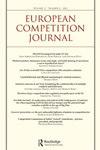忠诚度回扣和更经济的欧盟竞争法
Q2 Social Sciences
引用次数: 0
摘要
摘要2009年,欧盟委员会发布了关于占主导地位的企业滥用排他性行为的第102条指导意见。该指导方针以更经济的竞争政策方法为基础。本文研究了更经济的忠诚度回扣方法对福利的影响。首先,本文提出了一个经济框架,将假阳性和假阴性概率的权重与法律规范联系起来。之后,本文讨论了指导文件之前的案例(i.a.Hoffmann La Roche)、指导文件本身以及指导文件之后的案例(i.a.Intel)。在指导文件发布后的一段时间内,我们观察到用于防止误报的权重呈非线性增加。论文的结论是,为了进一步限制误报造成的福利损失,应该以限制性的方式定义被认为是滥用的回扣类别。此外,在执法中,应优先考虑在所有情况下预计对消费者危害最大的案件。本文章由计算机程序翻译,如有差异,请以英文原文为准。
Loyalty rebates and the more economic approach to EU competition law
ABSTRACT In 2009 the European Commission published the art. 102 guidance regarding abusive exclusionary conduct by dominant undertakings. The guidance is based on the more economic approach to competition policy. This paper investigates the welfare implications of the more economic approach to loyalty rebates. First, the paper presents an economic framework linking weights attached to probabilities of false positives and negatives and the legal norm. After that, the paper discusses cases before the guidance paper (i.a. Hoffmann-La Roche), the guidance paper itself, and cases after the guidance paper (i.a. Intel). In the period after the guidance paper, we observe a non-linear increase in the weight attached to preventing false positives. The paper concludes that to further limit welfare losses due to false positives, the category of rebates that is assumed to be abusive should be defined in a restrictive way. Furthermore, in law enforcement priority should be given to cases that, considering all the circumstances, can be expected to be most harmful to consumers.
求助全文
通过发布文献求助,成功后即可免费获取论文全文。
去求助
来源期刊

European Competition Journal
Social Sciences-Law
CiteScore
1.50
自引率
0.00%
发文量
12
期刊介绍:
The European Competition Journal publishes outstanding scholarly articles relating to European competition law and economics. Its mission is to help foster learning and debate about how European competition law and policy can continue to develop in an economically rational way. Articles published in the Journal are subject to rigorous peer review by leading experts from around Europe. Topics include: -Vertical and Conglomerate Mergers -Enlargement of the Union - the ramifications for Competition Policy -Unilateral and Coordinated Effects in Merger Control -Modernisation of European Competition law -Cartels and Leniency.
 求助内容:
求助内容: 应助结果提醒方式:
应助结果提醒方式:


